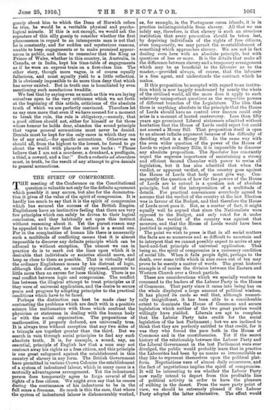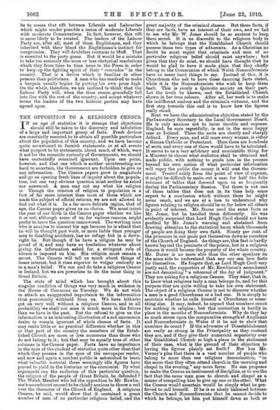THE SPIRIT OF COMPROMISE. T HE meeting of the Conference on
the Constitutional question is valuable not only for the definite agreement which possibly it may secure, but also for the demonstra- tion it gives of the value of the spirit of compromise. It is hardly too much to say that it is the spirit of compromise which has secured the success of the British Empire. Englishmen have an instinctive feeling that there are very few principles which can safely be driven to their logical conclusion, and they habitually act upon this instinct without reasoning about it. Yet the purest reason may be appealed to to show that the instinct is a sound one. For in the complexities of human life there is necessarily such a multitude of conflicting causes that it is almost impossible to discover any definite principle which can be adhered to without exception. The utmost we can in practice do is to mark out the lines upon which it is desirable that individuals or societies should. move, and keep as close to them as possible. That is virtually what the ordinary Englishman means by his distrust of logic, although this distrust, as usually expressed, amounts to little more than an excuse for loose thinking There is no real conflict between logic and compromise. The conflict lies between the illogical attempt to treat principles as if they were of universal application, and the desire to secure peace and progress by adapting principles to the practical conditions which have to be faced.
Perhaps the distinction can best be made clear by contrasting the problems which are dealt with in a positive science like mathematics with those which confront the physician or statesman in deali g with the human body or with the social organisation. The propositions of mathematics, if properly deduced, are universally true. It is always true without exception that any two sides of a triangle are together greater than the third. But we search in vain through social principles to find any such absolute truth. It is, for example, a sound, nay, an essential, principle of English law that a man may not contract away his rights as a free citizen, and this principle is one great safeguard against the establishment in this country of slavery in any form. The British Government have permitted in various Crown Colonies the establishment of a system of indentured labour, which in many cases is a mutually advantageous arrangement. Yet the indentured. person does temporarily agree to forgo several of the rights of a free citizen. We might even say that he ceases during the continuance of his indentures to be in the full sense a freeman. So much is this the case, that where the system of indentured labour is dishonourably worked, as, for example, in the Portuguese cocoa islands, it is in practice indistinguishable from slavery. All that we can safely say, therefore, is that slavery is such an atrocious institution that every precaution should be taken lest, by depriving individuals of the rights of free citizens, even temporarily, we may permit the re-establishment of something which approaches slavery. We are not in fact dealing even here with an absolute principle, but with questions of less or more. It is the details that make all the difference between slavery and a temporary arrangement which may be as beneficial to the labourer as to the master,—provided always, of course, that the labourer is a free agent, and understands the contract which he makes.
If this proposition be accepted with regard to an institu- tion which is now happily condemned by nearly the whole of the civilised world, all the more does it apply to such relatively unimportant questions as the respective powers of different branches of the Legislature. The idea that there is anything absolute in the principle that the House of Lords should have no control over finance could only arise in a moment of heated controversy. Less than fifty years ago prominent Liberal statesmen admitted without hesitation that the House of Lords could reject but could not amend a Money Bill. That proposition itself is open to an almost infinite argument because of the difficulty of deciding what is a Money Bill. In the same way with the even wider question of the power of the House of Lords to reject ordinary Bills, it is impossible to discover any absolute proposition. The Spectator has constantly urged the supreme importance of maintaining a strong and efficient Second Chamber with power to revise all legislation, but it has also admitted that when the verdict, or apparent verdict, of the country goes against the House of Lords that body must give way. Con- sequently the question of how far the powers of the House of Lords are to extend is a question not of absolute principle, but of the interpretation of a multitude of details. For practical convenience everybody agreed to assume that the verdict of the country at the last Election was in favour of the Budget, and that therefore the House of Lords must pass it. But, as a matter of fact, it might equally well be argued that since the Nationalists were opposed to the Budget, and only voted for it under duress, the verdict of the country was against that measure, and that the House of Lords would have been justified in rejecting it. The point we wish to press is that in all social matters the facts are so numerous and so difficult to ascertain and to interpret that we cannot possibly expect to arrive at any hard-and-fast principle of universal application. That being so, the spirit of compromise is a necessary condition of social life. When it fails people fight, perhaps to the death, over some trifle which in nine cases out of ten may prove to be merely a matter of words. The great historic example is of course the division between the Eastern and Western Church over a Greek particle.
These are considerations which we specially venture to commend to the leaders of the Labour Party in the House of Commons. That party since it came into being has on the whole displayed a large amount of political wisdom. It has played its cards so well that, although numeri- cally insignificant, it has been able to a considerable extent to dominate the House of Commons and secure legislation which neither of the two great parties would willingly have yielded. Liberals are apt to complain that the Labour Party take credit for the social legislation of the last Parliament ; but we are inclined to think that they are perfectly entitled to that credit, for it was they who forced the pace both in the House of Commons and in the constituencies. Yet if the secret history of the relationship between the Labour Party and the Liberal Government in the last Parliament were ever divulged, the public would probably learn that in practice the Labourites had been by no means so irreconcilable as they like to represent themselves upon the political plat- form. Negotiations were of almost daily occurrence, and the fact of negotiations implies the spirit of compromise. It will be interesting to see whether the Labour Party now really intend to depart from this profitable line of political activity in order to have the pleasure of sulking in the desert. From the mere party point of view, we should be extremely pleased if the Labour Party adopted the latter alternative. The effect would be to create that rift between Liberals and Labourites which might render possible a union of moderate Liberals with moderate Conservatives. In fact, however, this rift is never likely to be created. The leaders of the Labour Party are, after all, most of them Englishmen, and they inherited with their blood the Englishman's instinct for compromise. They will doubtless continue to bluff. That is essential to the party game. But it would be a mistake to take too seriously the more or less rhetorical resolutions which they from time to time issue to the Press in order to keep up the fighting spirit of their " comrades " in the country. That is a device which is familiar to other persons than politicians. A man who has resolved to make a bargain usually begins by putting his own price high. On the whole, therefore, we are inclined to think that the Labour Party will, when the time comes, gracefully fall into line with the rest of the country, and accept whatever terms the leaders of the two historic parties may have agreed upon.























































 Previous page
Previous page